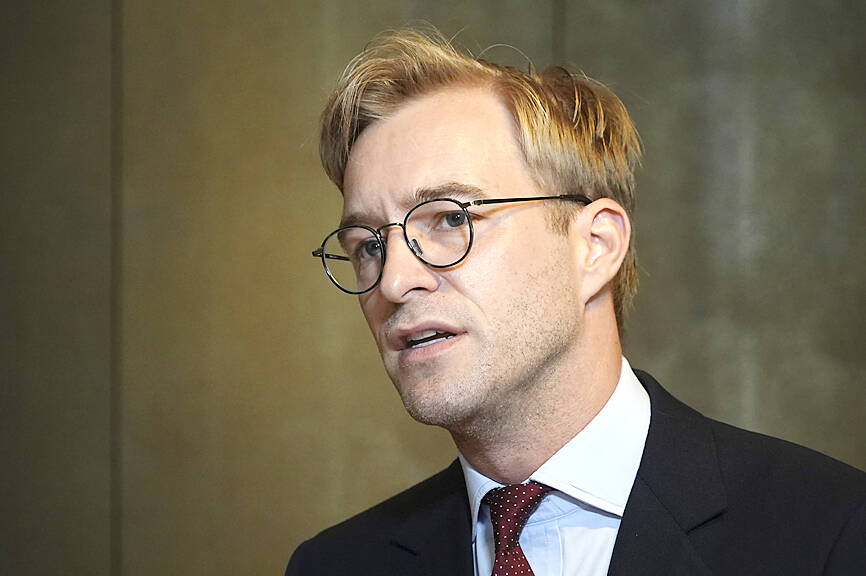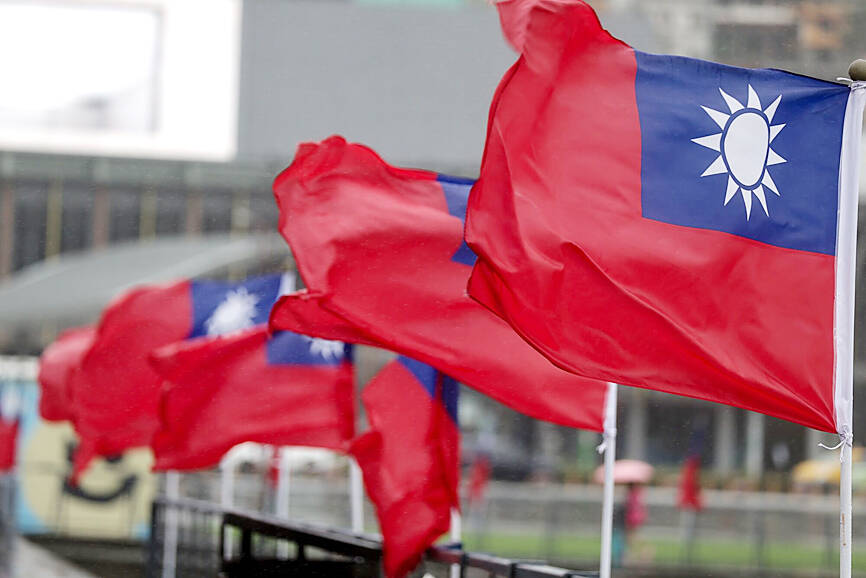Chinese diplomats are pressuring lawmakers from at least six countries not to attend a China-focused summit in Taiwan, participants said.
Politicians in Bolivia, Colombia, Slovakia, North Macedonia, and Bosnia and Herzegovina, and one other Asian country that declined to be named, say they are receiving texts, calls and urgent requests for meetings that would conflict with their plans to travel to Taipei, in what they describe as efforts to isolate Taiwan.
The Inter-Parliamentary Alliance on China (IPAC) summit officially begins tomorrow. The alliance is a group of hundreds of lawmakers from 35 countries concerned about how democracies approach Beijing.

Photo: Chiang Ying-ying, AP
The Associated Press spoke to the organizers and three lawmakers, and reviewed texts and e-mails sent by Chinese diplomats to the lawmakers asking whether they were planning to participate in the summit.
“I’m Wu, from Chinese Embassy,” read a message sent to Macedonian lawmaker Antonio Milososki. “We heard that you got an invitation from IPAC, will you attend the conference which will be held next week in Taiwan?”
In some cases, lawmakers described vague inquiries about their plans to travel to Taiwan. In other cases, the contact was more menacing.

Photo: I-Hwa Cheng, Bloomberg
One lawmaker said that Chinese diplomats messaged the head of her party with a demand to stop her from going.
“They contacted president of my political party, they ask him to stop me to travel to Taiwan,’’said Sanela Klarić, a member of parliament in Bosnia. ‘’They’re trying, in my country, to stop me from traveling…This is really not OK.’”
China routinely threatens retaliation against politicians and countries that show support for Taiwan, which has only informal relations with most nations due to Chinese diplomatic pressure.
Klaric said the pressure was unpleasant, but only steeled her determination to go on the trip.
“I really am fighting against countries or societies where the tool to manipulate and control peoples is fear,” she said, adding that it reminded her of threats and intimidation she faced during the Balkan wars in the 1990s. “I really hate the feeling when somebody is frightening you.”
The Chinese Ministry of Foreign Affairs did not immediately respond to a request for comment.
In a statement yesterday, IPAC said it “deplores and condemns the PRC’s [People’s Republic of China’s] attempt to interfere in its annual summit.”
“Democratically elected lawmakers are free to visit and support causes of their choosing. This is the normal exercise of their rights and responsibilities as elected officials,” it said.
“The PRC’s actions around IPAC’s Summit are yet another example of their brazen efforts to curtail other nations’ democratic privileges and negate Taiwan’s rights to engage in legitimate diplomatic exchanges,” it added.
The alliance, which aims to coordinate diplomacy in response to perceived threats from Beijing, has long faced pressure from the Chinese government.
Some members have been sanctioned by Beijing, and in 2021 the group was targeted by Chinese state-sponsored hackers, a US indictment unsealed earlier this year showed.
However, alliance executive director Luke de Pulford said the pressure from Chinese officials the past few days had been unprecedented.
During past meetings in other locations, lawmakers were approached by Chinese diplomats only after they concluded. This year, the pressure has sharply escalated and appears to be a coordinated attempt to stop participants from attending.
“This is gross foreign interference. This is not normal diplomacy,” De Pulford said. “How would PRC officials feel if we tried to tell them about their travel plans, where they could and could not go? It’s absolutely outrageous that they think that they can interfere in the travel plans of foreign legislators,” he said.
Lawmakers from 25 countries are expected to attend this year’s summit, which is to feature high-level meetings with Taiwanese officials, a news release said.
China has been peeling off Taiwan’s diplomatic allies, often with promises of development aid, in a long-running competition between the nations that has swung in Beijing’s favor in the past few years.
The Pacific Island nation of Nauru switched recognition to Beijing earlier this year, a move that reduced Taiwan’s number of diplomatic allies to 12.
However, China’s at times heavy-handed approach has also triggered backlash.
In 2021, Beijing downgraded relations and blocked imports from Lithuania, an EU and NATO member, after the Baltic nation broke with diplomatic custom by agreeing that a Taiwanese representative office in its capital of Vilnius would bear the name Taiwan instead of Taipei, which some other countries use to avoid offending Beijing.
The following year, the EU adopted a resolution criticizing Beijing’s behavior toward Taiwan and took action against China at the WTO over the import restrictions.
Most of the lawmakers targeted appear to be from smaller countries, which De Pulford said was likely because Beijing “feels that they can get away with it.”
However, he added that the coercive tactics has only made participants more determined to participate.
Miriam Lexmann, a Slovakian member of the European Parliament whose party head was approached by Chinese diplomats, said the pressure underscored her reason for coming to Taiwan.
We want to “exchange information, ways how to deal with those challenges and threats which China represents to the democratic part of the world, and of course, to support Taiwan,” she said.

The CIA has a message for Chinese government officials worried about their place in Chinese President Xi Jinping’s (習近平) government: Come work with us. The agency released two Mandarin-language videos on social media on Thursday inviting disgruntled officials to contact the CIA. The recruitment videos posted on YouTube and X racked up more than 5 million views combined in their first day. The outreach comes as CIA Director John Ratcliffe has vowed to boost the agency’s use of intelligence from human sources and its focus on China, which has recently targeted US officials with its own espionage operations. The videos are “aimed at

STEADFAST FRIEND: The bills encourage increased Taiwan-US engagement and address China’s distortion of UN Resolution 2758 to isolate Taiwan internationally The Presidential Office yesterday thanked the US House of Representatives for unanimously passing two Taiwan-related bills highlighting its solid support for Taiwan’s democracy and global participation, and for deepening bilateral relations. One of the bills, the Taiwan Assurance Implementation Act, requires the US Department of State to periodically review its guidelines for engagement with Taiwan, and report to the US Congress on the guidelines and plans to lift self-imposed limitations on US-Taiwan engagement. The other bill is the Taiwan International Solidarity Act, which clarifies that UN Resolution 2758 does not address the issue of the representation of Taiwan or its people in

US Indo-Pacific Commander Admiral Samuel Paparo on Friday expressed concern over the rate at which China is diversifying its military exercises, the Financial Times (FT) reported on Saturday. “The rates of change on the depth and breadth of their exercises is the one non-linear effect that I’ve seen in the last year that wakes me up at night or keeps me up at night,” Paparo was quoted by FT as saying while attending the annual Sedona Forum at the McCain Institute in Arizona. Paparo also expressed concern over the speed with which China was expanding its military. While the US

SHIFT: Taiwan’s better-than-expected first-quarter GDP and signs of weakness in the US have driven global capital back to emerging markets, the central bank head said The central bank yesterday blamed market speculation for the steep rise in the local currency, and urged exporters and financial institutions to stay calm and stop panic sell-offs to avoid hurting their own profitability. The nation’s top monetary policymaker said that it would step in, if necessary, to maintain order and stability in the foreign exchange market. The remarks came as the NT dollar yesterday closed up NT$0.919 to NT$30.145 against the US dollar in Taipei trading, after rising as high as NT$29.59 in intraday trading. The local currency has surged 5.85 percent against the greenback over the past two sessions, central